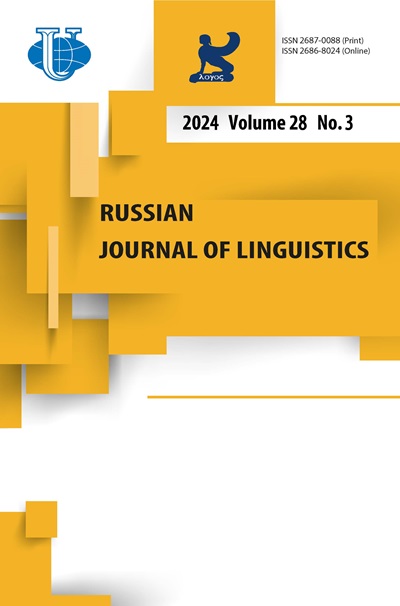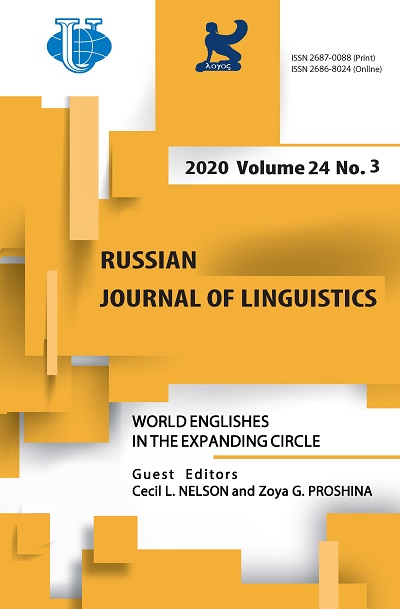Английский язык в Германии: сферы языкового использования и отношение к языку
- Авторы: Давыдова Ю.Г.1
-
Учреждения:
- Форарльбергский педагогический университет
- Выпуск: Том 24, № 3 (2020): Варианты английского языка Расширяющегося круга
- Страницы: 687-702
- Раздел: Статьи
- URL: https://journals.rudn.ru/linguistics/article/view/24406
- DOI: https://doi.org/10.22363/2687-0088-2020-24-3-687-702
Цитировать
Полный текст
Аннотация
В статье рассматривается изменение роли английского языка в Германии. Объектом исследования стало использование английского языка в разных сферах деятельности и отношение к нему. Исследование выполнено на материале двух кейсов, изученных в Мангеймском университете, Германия. В первом случае выполнен количественный анализ использования английского языка в формальном и неформальном контекстах, а также при спонтанном взаимодействии. Второй кейс представляет обсуждение результатов исследования отношения немецкоговорящих коммуникантов к двум национальным вариантам английского языка, являющегося родным для его носителей (британского и американского), и к двум вариантам (индийскому и немецкому), не являющимся родными для их пользователей. Тем самым рассматриваются аттитюдные тенденции к вариантам английского языка, включая собственный вариант пользователей. В заключение делается вывод о том, что несмотря на явные сигналы того, что английский язык, используемый в Германии, постепенно превращается в английский как второй язык, он, тем не менее, все еще остается иностранным языком, по крайней мере, судя по отношению к нему со стороны образованных молодых немцев.
Об авторах
Юлия Геннадьевна Давыдова
Форарльбергский педагогический университет
Автор, ответственный за переписку.
Email: julia.davydova@ph-vorarlberg.ac.at
доктор филологических наук, приват-доцент, профессор английской филологии факультета английской лингвистики / Институт 2
Liechtensteinerstraße 33-37; 6800 Feldkirch, AustriaСписок литературы
- Berns, Margie. 1988. The cultural and linguistic context of English in West Germany. World Englishes 7 (1). 37-49.
- Buschfeld, Sarah. 2013. The English Language in Cyprus: An Empirical Investigation of Variety Status. Amsterdam: John Benjamins.
- Buschfeld, Sarah. 2014. A critical approach to taxonomies and models of World Englishes and second language acquisition research. In Sarah Buschfeld, Thomas Hoffmann, Magnus Huber, & Alexander Kautzsch (eds.), The Evolution of Englishes. The Dynamic Model and Beyond, 181-202. Amsterdam / Philadelphia: John Benjamins.
- Buschfeld, Sarah, Thomas Hoffmann, Magnus Huber & Alexander Kautzsch (eds.). 2014. The Evolution of Englishes. The Dynamic Model and Beyond. Amsterdam / Philadelphia: John Benjamins.
- Busse, Ulrich & Manfred Görlach. 2002. German. In Manfred Görlach (ed.) English in Europe, 13-36. Oxford: Oxford University Press.
- Coleman, James A. 2006. English-medium teaching in European Higher Education. Language Teaching 39 (1). 1-14.
- Davydova, Julia. 2015. A study in the perception of native and non-native Englishes by German learners. Journal of Linguistics and Language Teaching 6 (1).
- Davydova, Julia. 2019. Quotation in Indigenised and Learner English. A Sociolinguistic Account of Variation. Berlin / Boston: Mouton de Gruyter.
- Davydova, Julia & Isabelle Buchstaller. 2015. Expanding the circle to Learner English: Investigating quotative marking in a German student community. American Speech 90 (4). 441-478.
- De Swaan, Abram. 2001. Words of the World: The Global Language System. Cambridge: Polity Press / Blackwell.
- Garrett, Peter. 2010. Attitudes to Language. Cambridge: Cambridge University Press.
- Ginsburgh, Victor & Juan Prieto-Rodriguez. 2011. Returns to foreign languages of native workers in the EU. Industrial and Labour Relations Review 64 (3). 599-618.
- Gnutzmann, Claus, Jenny Jakisch, & Frank Rabe. 2015. Communicating across Europe. What German students think about multilingualism, language norms and English as a lingua franca. In Andrew Linn, Neil Bermel, Gibson Ferguson (eds.), Attitudes towards English in Europe. English in Europe 1. 78-88. Berlin / Boston: Mouton de Gruyter.
- Hilgendorf, Suzanne K. 2005. ‘Brain Gain statt [instead of] Brain Drain’: The role of English in German education. World Englishes 24 (1). 53-67.
- Hundt, Marianne & Ulrike Gut (eds.). 2012. Mapping Unity and Diversity World-wide. Amsterdam & Philadelphia: John Benjamins.
- Kachru, Braj B. 1985. Standards, codification and sociolinguistic realism: The English language in the Outer Circle. In Randoiph Quirk & H. G. Widdowson (eds.), English in the World: Teaching and Learning the Language and Literatures, 11-30. Cambridge: Cambridge University Press.
- Kautzsch, Alexander. 2014. English in Germany. Retreating exonormative orientation and incipient nativization. In Sarah Buschfeld, Thomas Hoffmann, Magnus Huber, & Alexander Kautzsch (eds.), The Evolution of Englishes. The Dynamic Model and Beyond, 203-227. Amsterdam / Philadelphia: John Benjamins.
- Knapp, Annelie. 2011. When comprehension is crucial. Using English as a medium of instruction at a German university. In Annick de Houwer, & Antje Wilton (eds.), English in Europe Today. Sociocultural and Educational Perspectives, 51-70. Amsterdam / Philadelphia: John Benjamins.
- Mair, Christoph. 2018. Stabilising domains of English-language use in Germany. Global English in a non-colonial languagescape. In Sandra C. Deshors (ed.), Modeling World Englishes. Assessing the Interplay of Emancipation and Globalisation of ESL Varieties, 45-75. Amsterdam / Philadelphia: John Benjamins.
- Mair, Christoph. 2020. English in the German-speaking world: An inevitable presence. In Raymond Hickey (ed.), English in the German-speaking World, 13-30. Cambridge: Cambridge University Press.
- Mesthrie, Rajend & Rakesh M. Bhatt. 2008. World Englishes. The Study of New Linguistic Varieties. Cambridge: Cambridge University Press.
- Mohr, Susanne, Sandra Jansen & Julia Forsberg. 2019. European English in the EFL classroom? English Today (online edition). doi: 10.1017/S0266078419000403.
- Mollin, Sandra. 2007. New variety or learner English? Criteria for variety status and the case of Euro-English. English World-Wide 28 (2). 167-185.
- Mukherjee, Joybrato & Marianne Hundt (eds.). 2011. Exploring Second-Language Varieties of English and Learner Englishes - Bridging a Paradigm Gap. Amsterdam & Philadelphia: John Benjamins.
- Ozón, Gabriel. 2016. European Englishes. In Andrew Linn (ed.), Investigating English in Europe: Contexts and Agendas. English in Europe 6. 72-78. Berlin / Boston: Mouton de Gruyter.
- Stavans, Anat & Charlotte Hoffmann. 2015. Multilingualism. Cambridge: Cambridge University Press.
- Syrbe, Mona & Heath Rose. 2016. An evaluation of the global orientation of English textbooks in Germany. Innovation in Language Learning and Teaching 12 (2). 152-163.
- Watson, Peter. 2010. The German Genius. Europe's Third Renaissance, the Second Scientific Revolution, and the Twentieth Century. New York: Harper.

















